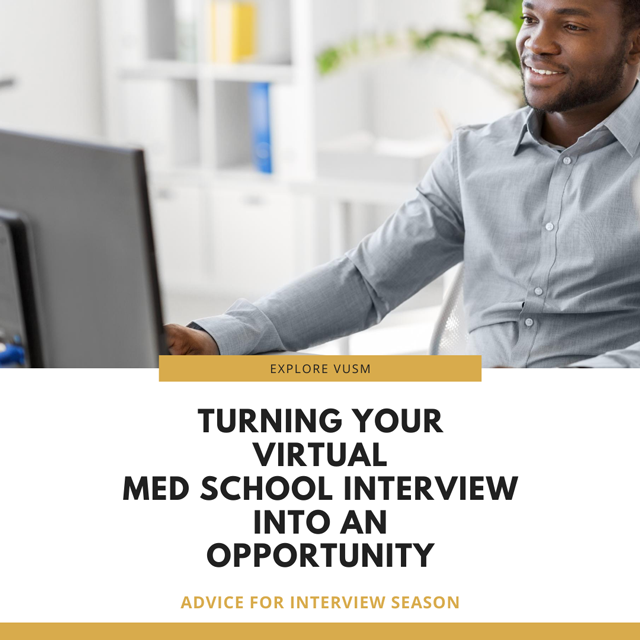Turning your virtual med school interview into an opportunity
by Emma Mattson

“‘Unprecedented’ simply means it hasn’t happened before. So, ‘unprecedented’ begets ‘opportunity.’”
These words of advice come from Donald Brady, MD, Senior Associate Dean for Health Sciences Education, and are especially applicable for med school applicants this fall, facing a round of virtual interviews.
Transitioning med school interviews to a virtual format certainly counts as “unprecedented,” but, as Brady said, that shouldn’t be a cause for panic.
In fact, virtual interviews can be a wonderful opportunity to demonstrate your resilience and adaptability—two crucial qualities in any great med student or physician.
This month, we sat down with members of the VUSM admissions committee to gather advice and encouragement for this year’s interview season.
Don’t be afraid to address the elephant in the room.
Joey Barnett, PhD, faculty co-chair for the VUSM admissions committee, advises applicants to treat the interview, as much as possible, like a traditional med school interview.
This means applicants should be prepared to address the same points they normally would. Demonstrate how your experiences have helped you along in your journey to med school. Emphasize the unique perspective or priorities you bring to the medical field.
But, Barnett added, consider discussing how you’ve addressed any challenges you met during the pandemic.
“Applicants who see [the pandemic] as a challenge to be able to continue to grow in their journey and be able to convey that to the admissions committee— I see that as a real plus,” Barnett said. “I encourage students to think about how they can do that.”
Don’t be afraid to talk about how the pandemic has demanded adaptability and resilience from you personally.
“It will certainly resonate with committee members or interviewers or medical school administrators, because guess what? That’s what we’re all doing right now: we’re being adaptable and resilient,” Barnett said.
What’s more, Senior Assistant Director of Admissions Christina Twist said the admissions committee remains cognizant that, for many, the spring and summer before the application cycle did not go as planned.
“[We remind faculty] that a lot of our applicants had experiences planned for this summer or even the spring semester that they didn’t get to participate in and [they should] look and see what activities and experiences they had leading up to 2020 and evaluate that,” Twist said.
“Instead of ‘Oh, they didn’t do X, Y, and Z for the past six months’— well, no one did X, Y, and Z for the past six months,” Twist said. She noted that there has been an additional, optional question to the VUSM secondary application where applicants have the opportunity to share how COVID impacted their pathway to medical school. “I completely understand that candidates may be nervous about the idea of trying to put their best foot forward while doing virtual interviews, but I want them to know that medical schools are nervous too. This is a new process on the medical school side of the equation, and we all are just as worried about being able to put our best foot forward in the virtual world,” Twist said.
Appreciate this unique time to enter medical school.
“As I told the first-year students at their White Coat Ceremony on [August 5], they have the extraordinarily good fortune to enter medicine at a time in which they can help influence how the world survives through and thrives after COVID,” Brady said.
This might take the form of discovery, novel care delivery, or innovative education, Brady said, but also includes the call to mitigate and overcome health disparities and social injustices.
Cathy Fuchs, MD, faculty co-chair for the VUSM admissions committee, echoed this sentiment.
“It gives students an opportunity to be a part of the process and think through the scientific approach to managing a pandemic,” Fuchs said. “It also gives them an opportunity to really think about the impact of disease from a public health perspective and learn to think about medicine broadly in terms of health inequities, disparities, and how that applies to all of medicine.”
At the end of the day, the essentials of what it means to be a med student haven’t changed.
“The COVID pandemic doesn’t really change what I would like to see [in med students],” Brady said. “I want a diverse class, and not just racial and ethnic diversity, which is really, really important. It’s diversity of thought, it’s diversity of background, it’s diversity of talent.”
“We do better as a medical school and medical center when we have people coming with all different types of experiences, backgrounds, and exposures to see problems and issues in health care from different angles,” Brady said. “It’s pulling those angles together that gives you a better picture of what you need to do.”
No matter the circumstances, the MD admissions office is here to support applicants along the way.
“COVID or not, the admissions cycle for med school is long,” Twist said. “It does require patience, and we’re in it to help the applicant and advocate for them as best we can.”